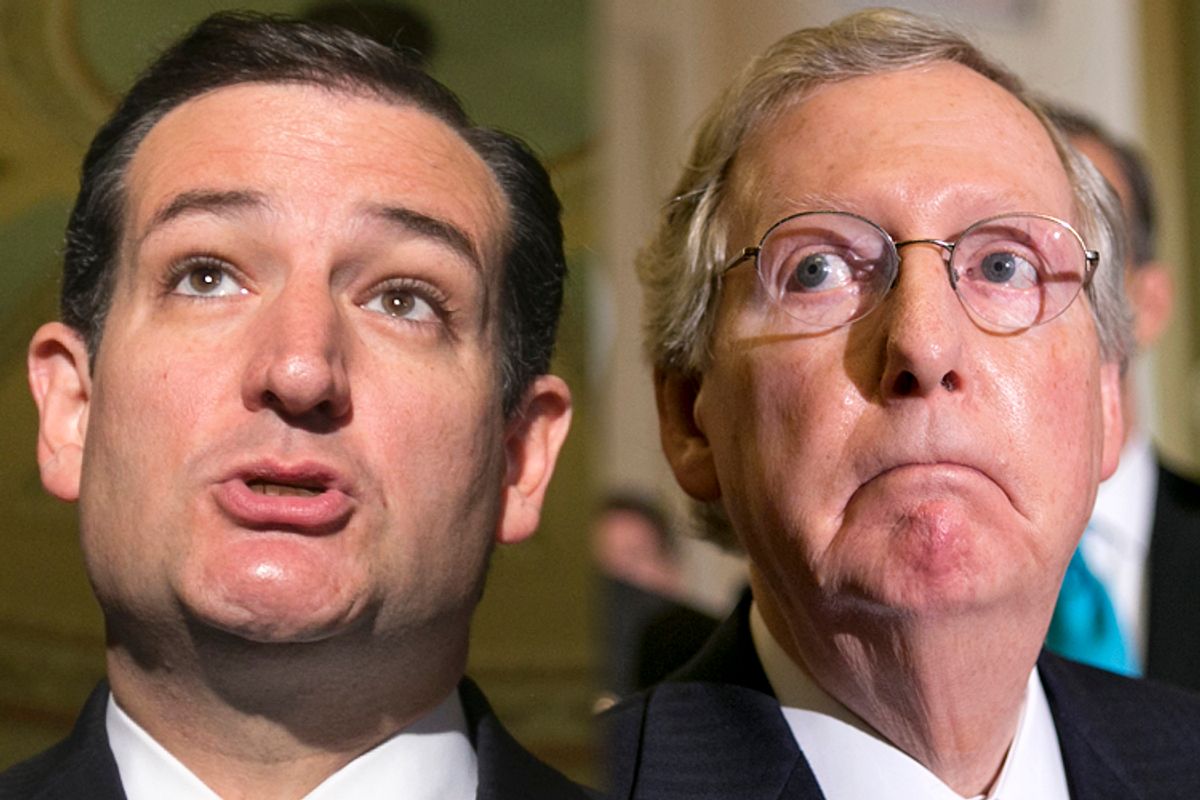Congratulations, everyone. We made it through another lazy, hazy August in which there wasn’t much to talk about besides the many crises that erupted at home and all over the world. Now that Labor Day is behind us and the midterm elections are a scant two months away, campaign coverage will dominate every waking moment of our existence and tip us all quite efficiently over the edge of insanity.
To get things started, the Republicans are throwing a bit of a curveball. Conventional wisdom argues that the GOP is well positioned to make significant gains in November owing to the unpopularity of the president, but a number of Republicans and conservatives are worried that anti-Obama sentiment won’t carry them as far as they’d expected. This, in turn, is leading Republicans to the slow, belated realization that the GOP, as a party, doesn’t really have a coherent agenda.
Politico reports that GOP strategists are (privately) concerned that, despite all the factors working in their favor this cycle, Republican on the House side have not been able to put together the crushing electoral “tsunami” that top party officials so confidently predicted earlier this year:
POLITICO interviewed more than a dozen top strategists from both parties about their outlook for the House in the midterms, and their assessment was nearly unanimous: Republicans are on track to expand their majority by only five or six seats, or roughly half their goal. The conversations covered everything from advertising strategies to fundraising to polling.
The editors at National Review took stock of the situation and came up with an answer for why the GOP can’t slam the door on the Democrats: The party isn’t actually running on anything:
Republicans continue to lack any strategy for winning the November elections beyond avoiding mistakes and hoping that President Obama’s unpopularity, especially in key states, delivers control of the Senate to them. It must be said that the party has executed this passive count-on-a-wave strategy fairly well, selecting presentable and sometimes admirable candidates. The strategy could even work. But it will not maximize the Republican opportunity, because it does nothing to dispel the public’s justifiable doubts about whether Republican rule would be good for the country.
What explains all this? The oversimplified answer is, in a word, Obamacare. Much of the initial talk about the Republican “tsunami” happened while the Affordable Care Act was stumbling through its glitch-heavy rollout. Pretty much everyone on the right fell victim to over-exuberance at just how far antipathy toward the ACA could take them, which is why conservative pundits were busily measuring drapes for long-shot candidates like Oregon Republican Monica Wehby. The candidates and strategists have realized since then that opposition to the president’s health reform law isn’t enough to win. They’ve backed off considerably to make room for other issues, but the Republican stance on the Affordable Care Act hasn’t evolved much beyond “repeal and replace.”
National Review’s solution for this is for Republican candidates to actually spell out their health reform policy and campaign on it: “What they ought to be saying is that they will replace it with something along the lines of the legislation that Senators Coburn, Burr, and Hatch have proposed.” Campaigning on ideas? What a concept!
It’s been four years since the ACA passed and Republicans haven’t been able to settle on an Obamacare replacement in that time, so there’s no reason to think they’ll come to a consensus so soon before voting starts. A candidate who advocates on behalf of the Coburn-Burr-Hatch plan would face a number of uncomfortable questions about the disruptions it would cause to the existing insurance marketplace, its comparatively weak protections for people with preexisting conditions, and its dismantling of expanded Medicaid.
The Medicaid issue is a key one. While the law itself may be unpopular, more and more states are electing to expand Medicaid after initially refusing. Most of the states that shunned expanded Medicaid the first time around are conservative and led by Republicans, so a candidate who embraces the Coburn-Burr-Hatch plan will have to explain why he or she can’t tolerate expanded funding for Medicaid when conservatives like Indiana Gov. Mike Pence found a way.
But really, the question of whether the GOP stands for anything going into the election could be moot. Republican strategists and National Review are concerned that the rudderless Republican campaign will mean that the party won’t be able to maximize the structural advantages it enjoys and run up the score on the Democrats. But the environment as it exists is friendly enough to the Republicans that they can keep being the party of nothing and still stand a better than even shot at taking control of the Senate. When you stand a good chance of winning simply by making vague promises to obstruct President Obama, why go through the trouble of creating an actual governing plan?
And if the Republicans do take the Senate, even if it’s by a hair’s breadth, you’ll have GOP strategists and conservative pundits tripping over themselves to get in front of a cable news camera and proclaim that the American people rose up in profound disgust and delivered a clear “mandate” to the Republicans to do … whatever it is they said they would do.

Shares